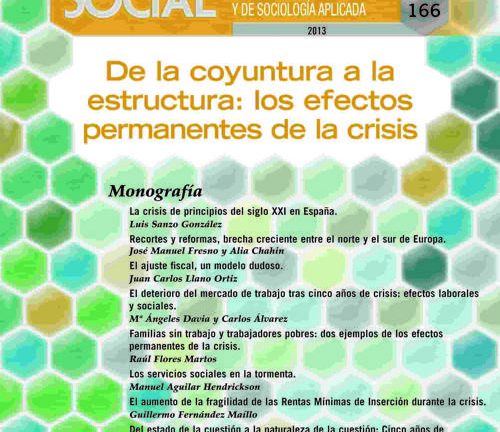Corporate Documentation No. 166
JOURNAL OF SOCIAL STUDIES AND APPLIED SOCIOLOGY
Of the joint to the structure: the permanent effects of the crisis
Several Authors
From the end of 2008 the first effects of the crisis became visible. The bursting of the housing bubble, the massive destruction of employment, the rapid increase in the rate of poverty and social exclusion, and the sudden limitation of access to credit, made it clear that the illusion of growth in Spain had ended.
So, without barely time to make us aware, we went from being economic yardstick within the EU to be forced to digest a situation, frankly, complicated. But beyond the specifics, the fundamental question that we faced was the structural nature of this crisis is complex and multidimensional, we were transforming as a society.
But, along with these changes have come other that will undoubtedly involve basic changes in our model. The tightening of requirements and the disappearance of aid measures are evidence that, faced with this reality of suffering for many families, we are witnessing the weakening of mechanisms of protection and distribution on the part of Public Administrations.
Assurance mechanisms of the society have been weakened in this time and the austerity policies have resulted in greater vulnerability of the Spanish society.
Given this reality, it is the question of whether the crisis, in addition to effects short-term, is involving other cut structural. Or to put it another way, if this crisis is creating a new society with a different DNA to that which existed in earlier times.
To this question we try to answer with the present monograph and the articles in it are included.
.
Index
Presentation. Francisco Lorenzo
Monographs
- The crisis of the early XXI century in Spain. Luis Sanzo González
- Cuts and reforms, the growing gap between the north and the south of Europe. José Manuel Fresno and Alia Chahin
- The fiscal adjustment, a model doubtful. Juan Carlos Llano Ortiz
- The deterioration of the labour market after five years of crisis: employment effects and social. Mª Ángeles Davia and Carlos Álvarez
- Families without work and the working poor: two examples from the permanent effects of the crisis. Raul Flores Martos
- The social services in the storm. Manuel Aguilar Hendrickson
- The increase of the fragility of the Minimum Insertion Income during the crisis. Guillermo Fernández Maíllo
- The state of the question of the nature of the issue: Five years of Observatory of Social Reality of Caritas. Juan José López Jiménez
- Poverty, processes of impoverishment and changes in the structure of the society. Victor Renes Ayala
- Crisis, Inequality and Poverty: Learning from the developing world to social cuts in Spain. Teresa Cavero Gómez
Documentation
- How to social fragmentation? Three new reports on inequality in Spain.
Book reviews
- Socialization of poverty in Spain: gender, age, and work on the risks against poverty. Angel Benzunegui and Francesca Petriliggieri
- Accompanying… to us. Look, action, and proposals of caritas with people who are homeless. Sonia Olea Ferreras
- Human security. Critical inputs to the discussion of theoretical and political.Karlos Pérez de Ermine and Irantzu Mendia Azkue (editors).
Buy this Monograph
For more information: [email protected]
.

